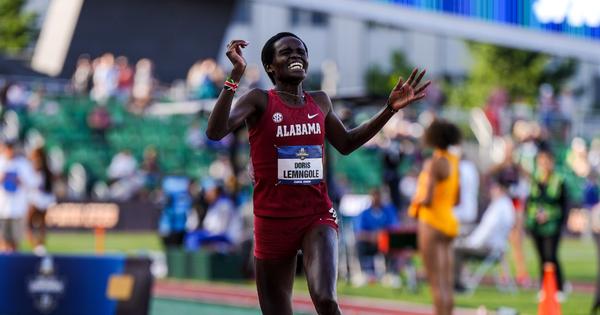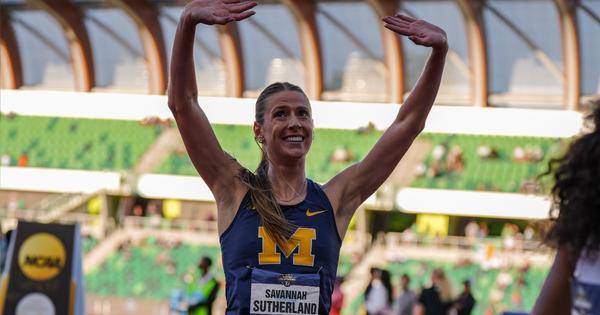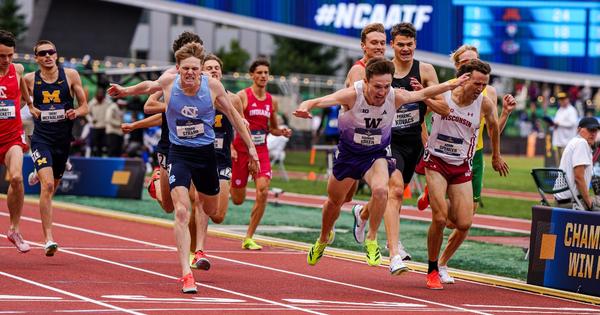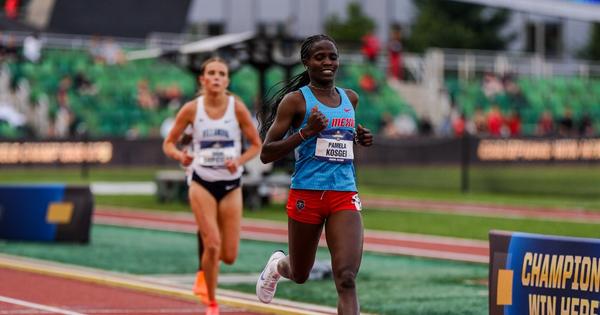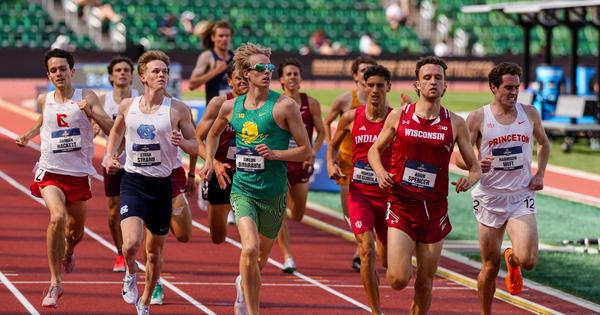By David Melly
June 18, 2025
The 2025 NCAA season is in the books, and what a season it was.
Ten collegiate records went down, including two this past weekend. A college athlete set his second world record this spring (which is two more world records than he has NCAA titles). Five different programs won team titles across the cross country, indoor, and outdoor campaigns—none of whom had won the year prior.
New stars arrived on the scene. Jordan Anthony of Arkansas proved his indoor 60m title was no fluke with a 100m victory, a second-place run in the 200m, and a third-place team effort in the 4x100m. While he didn’t deliver on his pre-final suggestion that he might break the American record, he’ll have more chances this summer: Anthony announced he was turning pro, forgoing his remaining eligibility in both track and field and football, where he was a wide receiver for the Razorbacks.
After losing her NCAA 200m title defense attempt indoors, South Carolina’s JaMeesia Ford couldn’t be denied in her primary event outdoors, clocking the first sub-22 of her career in the prelims and following it up with a 22.21 victory in the final. She came within 0.004 seconds of completing the 100m/200m double, but USC’s Samirah Moody beat her to the line by a hair in the shorter event. Heading into USAs, however, fans—and rivals—will remember Ford’s prelim day first and foremost, where she ran 10.87 (NCAA #6 all-time) and 21.98 (NCAA #5 all-time) about an hour apart. If the 20-year-old can hold that form into August, she’ll be a threat to make her first senior team in one or both events.
Speaking of podium threats, we have to talk about Doris Lemngole. The Alabama superstar was already the NCAA champion and collegiate record holder in the steeplechase, and after she jogged a 9:27 prelim looking, frankly, like she couldn’t run any slower if she tried, her heavy favorite status was cemented heading into the final. But no one—perhaps not even Lemngole or her coaches—was prepared for the show she put on in the final. She knocked an astonishing 12 seconds off her own record to run a world-leading 8:58.15, the first sub-9-minute performance in the world this year and in NCAA history. With World/Olympic champ Winfred Yavi having a slow start to the season, Lemngole couldn’t just medal in Tokyo—she’s got a legit shot at winning.
Running really, really fast was something of a theme across the board in the women’s distance events. Five runners bettered Parker Valby’s one-year-old meet record in the 10,000m, led by now-double-champ Pamela Kosgei, and four got under Suzy Favor’s 35-year-old mark in the 800m. Unfortunately for Michaela Rose, she broke the meet record on the wrong day, running 1:58.95 from the front in the prelims but getting outkicked by Roisin Willis, Makayla Paige, and Meghan Hunter in the final. Willis’s victory has to be one of the most satisfying for longtime fans. The Stanford junior has had an up-and-down collegiate career that included an indoor title as a freshman in 2023 that she hadn’t managed to replicate in the four championships since, but she’s running better than ever now.
The men’s 1500m wasn’t fast—at least at the start—but it sure was fascinating. For the fourth year in a row, a UW Husky came away with the title, and for the second time in three years, that Husky was Nathan Green. One could argue that the field was watered down when NCAA mile champ Abel Teffra and 1500m collegiate record holder Liam Murphy missed the final… but “one” would be dumb as hell, because Green still had to take down Wisconsin’s Adam Spencer, Oregon’s Simeon Birnbaum, Virginia’s Gary Martin, and the hard-charging Ethan Strand of UNC.
Tactics aficionados and Andy Powell acolytes (hi Mac Fleet) were surely crowing in approval when Green, running at or near the front for much of the early-race jogfest, reached the finish line first despite Strand’s epic kick down the homestretch. Green’s last 400m was 51.46 to Strand’s 51.28, but the Tar Heel had to go from seventh to second in the final 200m and all that extra work cost him the title. The Strandom Fandom would likely point out in response that tactics are easier to learn over time than preternatural talent. If Strand can avoid making the same mistake again next month, he’s already shown that he has the toolbox to contend for a spot on a highly-competitive U.S. team.
On the men’s side, three days and 21 events of competition ended with… a whole lotta waiting. Texas A&M, led by veteran coach Pat Henry, and the USC Trojans helmed by two-time Olympic champion Quincy Watts, tied for the title at 41 points apiece, but both teams had to await the results of a protest (ultimately unsuccessful) in the 4x400m that could’ve shaken up the final scores. The women’s side ended in far less dramatic fashion, as the breadth of scoring potential across both track and field events carried the Georgia Bulldogs to victory—even after a relay scare of their own, as the 4x100m was disqualified for a botched handoff in the prelim.
Here, we have a couple notes for improvement on an otherwise fantastic weekend. If any event needs tiebreakers, it’s the premier team competition on the track and field schedule. The process could be intricate, like a head-to-head dual-meet scoring across events or a tally of individual victories, or it could simply come down to a 100-meter race between each team’s head coach. The latter would make for better television, certainly, but whatever the system, there should be one winner.
The other sticking point is that protests have gotten out of control. Virtually every event final turned red in the live results system as one or more coaches peeled off the requisite $100 bill needed for an appeal from the team wad. Ideally, races should be fairly arbitrated as they’re run, and secondarily, there should be a way to ensure post-facto justice. But NCAA track and field should take a cue from college basketball, which is updating its rules to limit coaches’ ability to call for an official review. Each team should get one “challenge flag” to file appeals, and if they’re successful, they get to keep the flag. But large, well-heeled teams with nothing to lose but a few Benjamins shouldn’t be afforded unlimited protests in the hopes that something shakes out their way upon closer scrutiny.
Where do all the college kids go from here? It’s an interesting question that can have very different answers for very different people. Winning the 100m at NCAAs is not quite the pipeline to professional success you might think, for example. In the last 20 years, only three women and six men have won global senior medals after winning collegiate titles – that’s a 26% success rate. The last ten women’s champions include only two individual World/Olympic medalists, but to be fair, Julien Alfred and Sha’Carri Richardson have had solid pro careers to say the least.
Some have already had success that’s likely to continue. 1500m champ Sophie O’Sullivan, 400m hurdles champ Nathaniel Ezekiel, and steeplechase champ James Corrigan went to the Olympics before they won their first collegiate titles… kinda a topsy-turvy way to build your resume, but the outcome is impressive nevertheless. But those in countries with stiff competition for their national teams—namely, Kenya, Jamaica, and the United States—are not going to be able to simply ride the wave of collegiate glory into Tokyo. 10,000m winners Pamela Kosgei and Ishmael Kipkurui are no locks for the Kenya teams, that’s for sure. Better to be Saskatoonian Savannah Sutherland, who gets to represent Team Canada internationally after winning her second 400H title for Michigan and therefore won’t have to go through Sydney McLaughlin-Levrone, Anna Cockrell, Dalilah Muhammad, and Jasmine Jones just to make her team.
Discus thrower Mykolas Alekna has a clear assignment moving forward: he’s got to figure out how to translate regular-season success into comparable championship results. The 22-year-old world record holder is 0 for 3 in NCAAs, and despite finishing on the podium of the last three global championships, he has no gold medals yet and only finished third at Euros in 2024 after winning in 2022. The curse of being a generational talent is that the bar is very, very high and likely to remain that way for the foreseeable future.
Like all college kids, the NCAA stars are headed into a summer of exciting possibility riding a roller coaster of end-of-year emotions. Some will head to their national championships with a healthy ego or a chip on their shoulder; others will head back to the drawing board in summer training. Many will pick up summer jobs, and for a lucky few that job will be Professional Runner. And it’s entirely possible that we’ll be watching a medal ceremony in Tokyo and look back on one June weekend in Eugene thinking “that’s where it really began.”
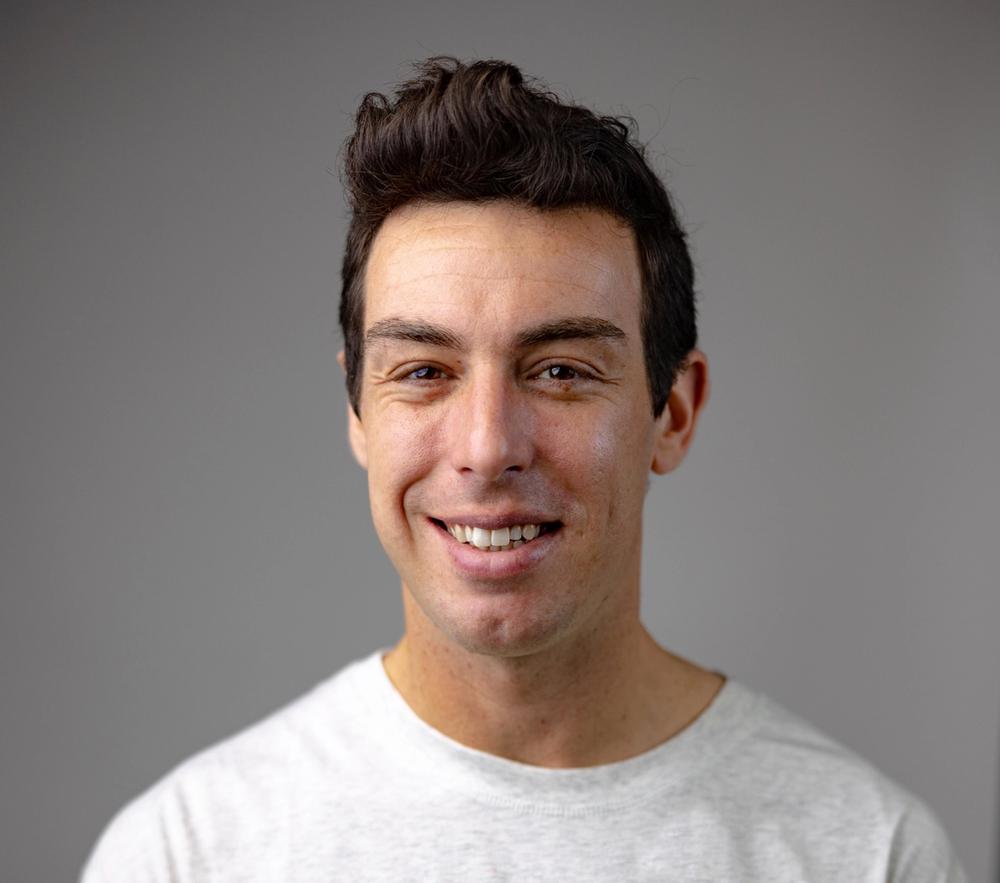
David Melly
David began contributing to CITIUS in 2018, and quickly cemented himself as an integral part of the team thanks to his quick wit, hot takes, undying love for the sport and willingness to get yelled at online.
